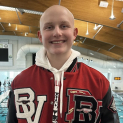IGFBPL1 Peptide-Centric Chimeric Antigen Receptor Autologous T Cells for Relapsed HLA-A*02 Neuroblastoma and Medulloblastoma

This project seeks to develop a new immunotherapy for children with relapsed neuroblastoma and medulloblastoma. These cancers of young children arise in the peripheral and central (brain) nervous systems, respectively, and have many common features that make them so aggressive and difficult to cure. Both are currently treated with very intensive chemotherapy and radiation therapy that are far too often ineffective, and even when cure is achieved, patients suffer lifelong disabilities directly related to their therapy. New therapeutic approaches are desperately needed. Cancer must evade the human immune system to grow and spread. The immune system recognizes foreign “targets”, whether they be a virus or abnormal proteins on cancer cells and seeks to eliminate these invaders. Cancer immunotherapy starts with identifying a target, and several outstanding targets have been leveraged for breakthrough new therapies such as CD19 for childhood leukemias. However, targets have been more difficult to find in solid malignancies. We have developed a new class of immunotherapies targeting highly tumor specific protein complexes we discovered with the first being tested in neuroblastoma patients later in 2024. This project focuses on the second new immunotherapy that is applicable to both neuroblastoma and medulloblastoma. In this Reach Grant we plan to complete all studies required for a clinical trial and do in-depth studies of this new therapy to optimize safety and curative potential.
Project Goal:
We have created a new “CAR T cell” therapy that will be developed further in this Research Grant to enable a clinical trial in 2026. We discovered that a protein called IGFBPL1 is important in the development of both neuroblastoma and medulloblastoma (and likely other childhood cancers as well), but the protein is not located on the surface of cancer cells, and thus cannot be “seen” by the immune system. We showed that pieces of this protein are visible to the immune system through our “HLA system”, which is the mechanism by which human cells present snapshots of what is inside (like a virus or abnormal cancer protein) to the immune system as a suicide request so that the abnormal cell can be eliminated. We developed ten CAR T cell immunotherapies to this IGFBPL1 protein and show potent killing of neuroblastoma and medulloblastoma cells in a test tube allowing us to prioritize two for further testing here. Now, we plan to: 1) Determine which CAR T cells is superior in terms of curing mice with human neuroblastoma and medulloblastoma and safest in a series of “preclinical” immunotherapy experiments. 2) Define how this living therapy thrives and persists to provide long-term “memory” to protect against future relapse. This will allow us to be smarter in our initial clinical trial and potentially to engineer improvements into future versions of this CAR if needed (e.g., if patients in the clinical trial respond but are not cured). We seek a transformative new therapy with ALSF.

